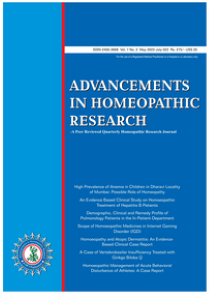Ensuring Meticulousness of Homeopathic Pharmacy for Accu racy in Medicinal Plant Identifica tion and Collection through Critical Taxonomical Intervention
DOI:
https://doi.org/10.48165/ahr.2024.9.2.6Keywords:
homoeopathic, Hahnemann, emphasizesAbstract
Homeopathic pharmacy is a specialized field within the broader realm of pharmacy that revolves around the principles and practices of homeopathy [1]. Dr. Samuel Hahnemann invented homeopathy in the late 18th century. It is a holistic medical system based on the concept that “like cures like” and emphasizes individualized treatment tailored to the patient’s unique symptoms [2]. In the context of homeopathic pharmacy, the term encompasses the identification, collection, preservation, specific preparation techniques, combining, compounding and standardization of medications [3]. It also covers the general operating knowledge of the pharmaceutical industry and how various preparations get distributed [4]. A holistic therapeutic approach of homeopathy primarily utilizes medicinal plants in its pharmaceutical preparations. The collected medicinal plants undergo
References
Millward, J., McKay, K., Holmes, J. T., & Owens, C. T. (2022). Pharmacist Knowledge and Perceptions of Homeopathy: A Survey of Recent Pharmacy Graduates in Practice. Pharmacy (Basel,
Switzerland), 10(5), 130. https://doi.org/10.3390/ pharmacy10050130
Ernst E. (2002). A systematic review of systematic reviews of homeopathy. British journal of clinical pharmacology, 54(6), 577–582. https://doi. org/10.1046/j.1365-2125.2002.01699.x
Bresee L. C. (2014). An introduction to developing surveys for pharmacy practice research. The Canadian journal of hospital pharmacy, 67(4), 286– 291. https://doi.org/10.4212/cjhp.v67i4.1373
Rehman, T., & Ahmad, S. (2017). Introduction of homeopathy and homeopathic medicines: A review. International Journal of Homoeopathic Sciences, 1(1), 21-25. DOI:10.33545/26164485.2017.
v1.i1a.7 Corpus ID: 201111677
Călina, D. C., Docea, A. O., Bogdan, M., Bubulică, M. V., & Chiuţu, L. (2014). The pharmacists and homeopathy. Current health sciences journal, 40(1), 57–59. https://doi.org/10.12865/CHSJ.40.01.10
Riedl P. (2011). Collection and cultivation of medicinal plants for homeopathy. Journal of medicinal and spice plants, 16, 87-92.
Woodward K. N. (2005). The potential impact of the use of homeopathic and herbal remedies on monitoring the safety of prescription products. Human & experimental toxicology, 24(5), 219–233. https://doi.
org/10.1191/0960327105ht529oa
Sofowora, A., Ogunbodede, E., & Onayade, A. (2013). The role and place of medicinal plants in the strategies for disease prevention. African journal of traditional, complementary, and alternative medicines: AJTCAM, 10(5), 210–229. https://doi.
org/10.4314/ajtcam.v10i5.2
Bharatan, V., & Humphries, C. J. (2002). Plant names in homeopathy: an annotated checklist of currently accepted names in common use. Homeopathy: the journal of the Faculty of Homeopathy, 91(3), 156–
https://doi.org/10.1054/homp.2002.0027 10. Bennett, B. C., & Balick, M. J. (2014). Does the name really matter? The importance of botanical nomenclature and plant taxonomy in biomedical research. Journal of ethnopharmacology, 152(3), 387–392. https://doi.org/10.1016/j.jep.2013.11.042 11. Bennett, B. C., & Balick, M. J. (2008). Phytomedicine 101: plant taxonomy for preclinical and clinical medicinal plant researchers. Journal of the Society for Integrative Oncology, 6(4), 150–157.
Calisher C. H. (2007). Taxonomy: what’s in a name? Doesn’t a rose by any other name smell as sweet? Croatian medical journal, 48(2), 268–270.
Calisher, C. H., & Mahy, B. W. (2003). Taxonomy: get it right or leave it alone. The American journal of tropical medicine and hygiene, 68(5), 505–506. https://doi.org/10.4269/ajtmh.2003.68.505




